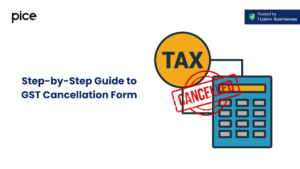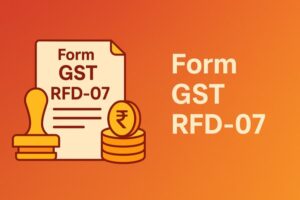An Overview Of GST on Entertainment Services In India
- 28 Oct 24
- 9 mins

An Overview Of GST on Entertainment Services In India
Key Takeaways
- GST unified entertainment tax, but some states still add extra levies.
- Higher GST rates raised ticket prices, affecting consumer spending.
- Input tax credit limitations create financial strain for entertainment businesses.
- GST simplified taxation for digital platforms, boosting online entertainment growth.
- State-specific taxes add to the entertainment sector’s already high GST burden.
From a global perspective, the Indian entertainment industry holds the fifth-largest rank. The overall impact of the companies involved in the entertainment sector is huge in our lives. Thus, in India, the media and entertainment brands have faced a pacy growth trajectory.
Earlier, multiple taxes by the Central Government as well as local taxes against the services offered by movie theaters existed. Later on, we witnessed the stipulation of GST on entertainment services that replaced all the previous taxes. Here, in this guide, you will learn about the collection of entertainment tax in detail.
What Is the Entertainment Tax?
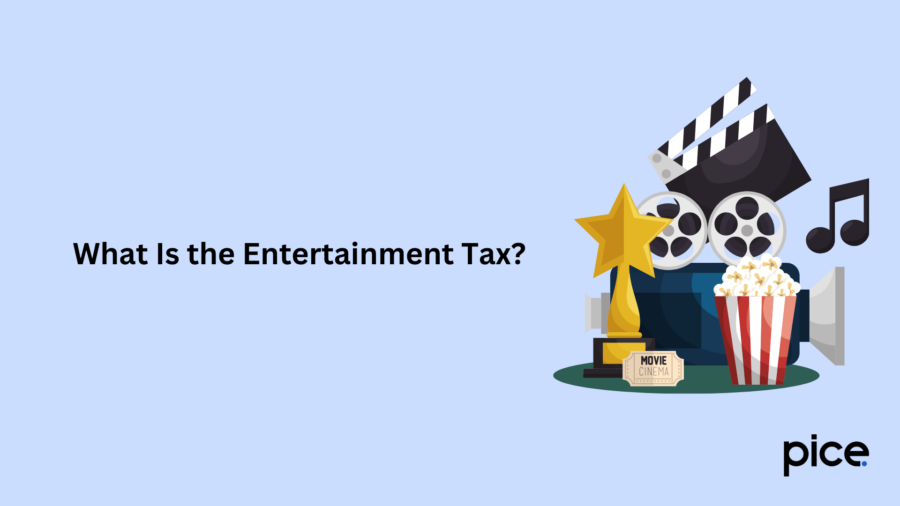
The term, entertainment tax defines a separate tax category that the government imposes on different categories of entertainment like movie tickets, festival entries, and other large-scale commercial gatherings.
Besides conventional costs for movie tickets, dramas, dance shows, etc., the application of entertainment tax also involves gaming and sporting events. However, the tax rate is decided by the respective State Government.
Entertainment Tax in India
First, the entertainment tax was introduced in 1948. At present, the GST Council has kept the average entertainment tax at 28% across most Indian states. In addition to movie tickets and gaming entries, gambling winnings also come under GST on entertainment services.
The GST rate on gaming event entries is 18% right now.
One needs to understand that the GST rates are controlled by the Central Government while the State Government levies the entertainment tax. A large part of the entertainment tax contributes to the development of the film and media industries.
What Are the Features of Entertainment Tax in India?
Some salient features of the entertainment tax are as follows:
- The entertainment tax is levied on a vast range of entertainment and amusement events such as movies, dramas, recreational sports, cricket matches and much more.
- The rate of GST levied on different forms of entertainment varies from one state to another.
- Some state governments levy the entertainment tax on both the end consumers and the organisers while others only impose tax on the service providers.
- A specific percentage of the gross ticket value is considered in each of such states, including Assam and West Bengal, compliance costs.
- Some state governments have a cap for the applicable tax per ticket.
Note: For complimentary tickets, entertainment tax is not levied.
Entertainment Tax Under GST
From July 2017, after the rollout of GST, the entertainment tax has been absorbed into GST. Therefore, you will hardly see 'entertainment tax' getting levied separately anywhere in India. Instead, a few states might stipulate an additional levy over GST as entertainment tax. The list of such states includes Assam, West Bengal, Bihar, Maharashtra, Kerala, Tamil Nadu, Madhya Pradesh, Odisha and Telangana.
GST for entertainment activities is now at 18%. This rate of tax is comparatively higher than the initial taxation, ranging from 15-20%. It has, therefore, increased the taxation liabilities of the entertainment industry. As a result, the ticket prices for cinema and other entertainment activities have gone up.
The extra tax charged by the states apart from the GST on an exhibition of cinema, typically ranges from 20-30%. Hence, the cumulative tax incidence on entertainment activities in the above-mentioned states has now risen to 38-48%. It is one of the highest tax rates in India in any sector.
It is vital to consider that these additional taxes are not uniform. For instance, in Maharashtra, the entertainment tax rate is 45%, and in Tamil Nadu, it is 15%. Similarly, in Kerala, the tax on a movie hall is 30%. On the other hand, in Madhya Pradesh, it is 25%.
Entertainment GST Rate in India
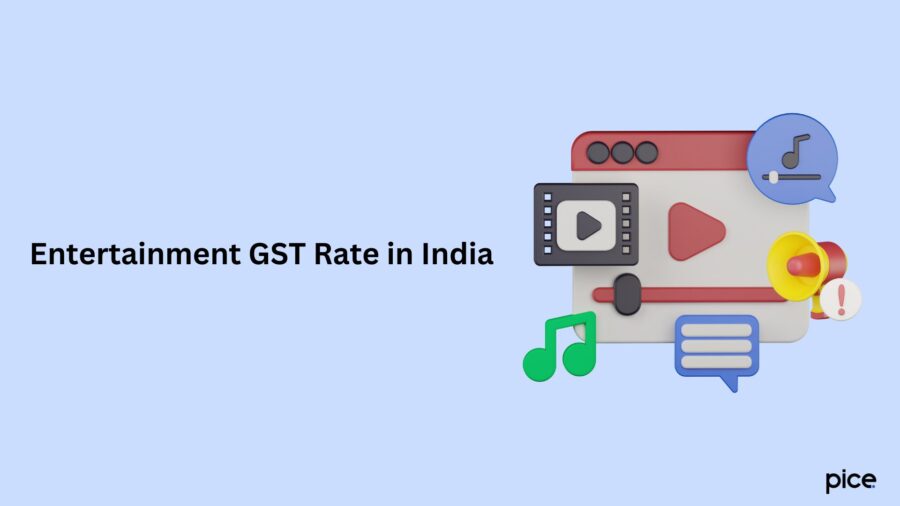
In the table provided below, you can see the GST rate applicable to the entire supply of film industry across different states:
| State | Total Tax Burden on Business |
| Bihar | 50% |
| Madhya Pradesh | 40% |
| Maharashtra | 45% |
| Assam | 15% |
| Jharkhand | 20% |
| Delhi | 20% |
| Tamil Nadu | 15% (however, movie tickets of Tamil films are not taxed) |
| Odisha | 25% |
As you may conclude, the cumulative tax burden in the entertainment sector seems to be pretty high. Thus, constant efforts are being put into lowering the heavy burden of taxes paid. It will ensure that most of the activities are easily available at affordable prices for the greater audience.
Impact of GST Rates on Entertainment Services
The Goods and Services Tax (GST) rates on the entertainment sector have affected both customers and entertainment industry owners in various ways. Here's a breakdown of the impact of taxes on entertainment:
For End Consumers
- Increased Ticket Sale Prices: Entertainment options like movie tickets, events, concerts and amusement parks have GST rates added to the base prices. This increase in ticket prices has raised the final costs for customers.
- Uniform Taxation Across Locations: The entertainment tax before GST was state-specific, meaning some states had higher or lower taxes. However, with GST, the tax structure involving this sector was made uniform. Thus, it is beneficial for customers in several states that previously incurred higher entertainment taxes.
For Entertainment Industry Owners
- Simplified GST Regime Involving the Film Industry: Before GST, the entertainment industry had to deal with multiple taxes, such as service tax, entertainment tax (which is still levied in some states) and VAT (Value Added Tax). GST later on simplified the tax structure, replacing these multiple levies with a single tax. This reduction in complexity allowed for easier business compliance and fewer disputes over tax payments.
- Limited Availability of Input Tax Credit: For entertainment businesses, including cinema halls, amusement activities or exhibitions, the input tax credit under GST has some limitations. Thus, businesses may not always be able to claim credits for input costs, which can create a cash flow strain. This restriction in recovering the cost of input is particularly relevant for those who need to invest upfront but are unable to recover tax paid on purchases.
- Impact on Ticket Sale Prices and Profit Margins: Owners of movie theatres may need to charge tax by adjusting their pricing strategies to ensure they remain profitable despite the added GST costs. For businesses already running with thin operating margins, a high GST rate reduces their profitability. Additionally, the film distributors feared to bring in price hikes which could potentially deter customers.
- Changes in Consumer Behavior: The pricing sensitivity after the introduction of GST drastically affected the demand for entertainment options. For example, high GST on film tickets or events pushed some customers toward digital entertainment platforms. Although these modes of entertainment are also subject to tax, they are more flexible in pricing.
Positive Impact of GST on Media and Entertainment
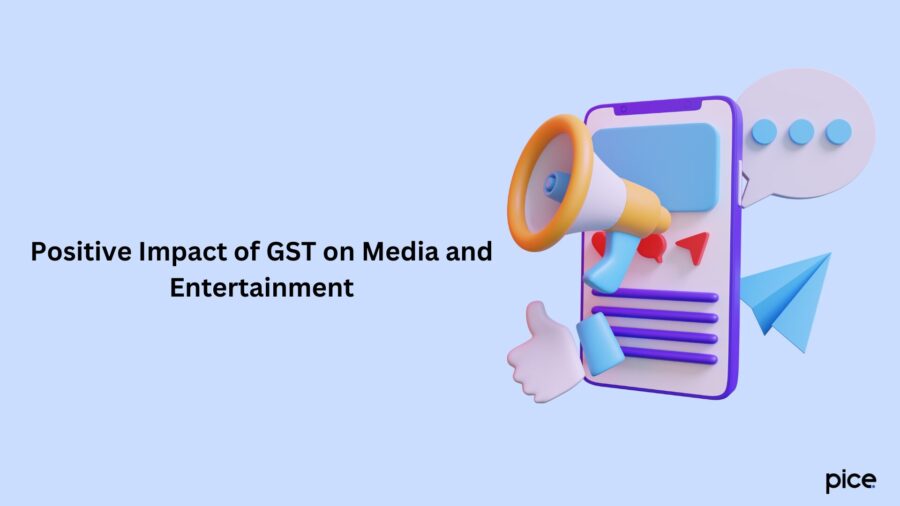
The most positive aspects of the GST implementation in the entertainment industry are as follows:
- Increased Transparency: The GST system is more transparent, reducing opportunities for tax evasion and ensuring better compliance levels.
- Ease in Supply of Services: A unified portal has improved the ease of doing business in the entertainment industry, especially for production houses that operate across multiple states.
- Growth of Digital Platforms: Platforms offering online supply of entertainment (OTT platforms) benefitted from a uniform 18% GST rate compared to earlier complex taxation regimes, promoting digital content creation and consumption.
Negative Impact of GST on Media and Entertainment
Some alarming disadvantages of GST on movie tickets and other forms of entertainment include:
- Higher Tax Rates for Some Segments: Some segments, such as cinema tickets above ₹100, attract a higher GST rate (28%). Compared to the earlier entertainment taxes in some states, these revised GST rates are higher, thus leading to increased costs for consumers.
- Impact on Regional Films: The increase in tax rates has hit regional and small-budget films harder. Higher ticket prices deterred audiences in Tier-2, Tier-3 cities and rural areas.
Conclusion
Overall, the new rates of entertainment tax on entertainment services have changed the Indian media and entertainment landscape largely for the better.
The specific impacts are different across states, depending on how much the previous tax regime placed a burden on consumers. While addressing the negatives, there are issues with high GST rates charged on exhibition of movies, amusement parks and concerts. However, the motive has always been to create a more standardised and modern taxation system in India.
💡If you want to streamline your payment and make GST payments, consider using the PICE App. Explore the PICE App today and take your business to new heights.
 By
By 










